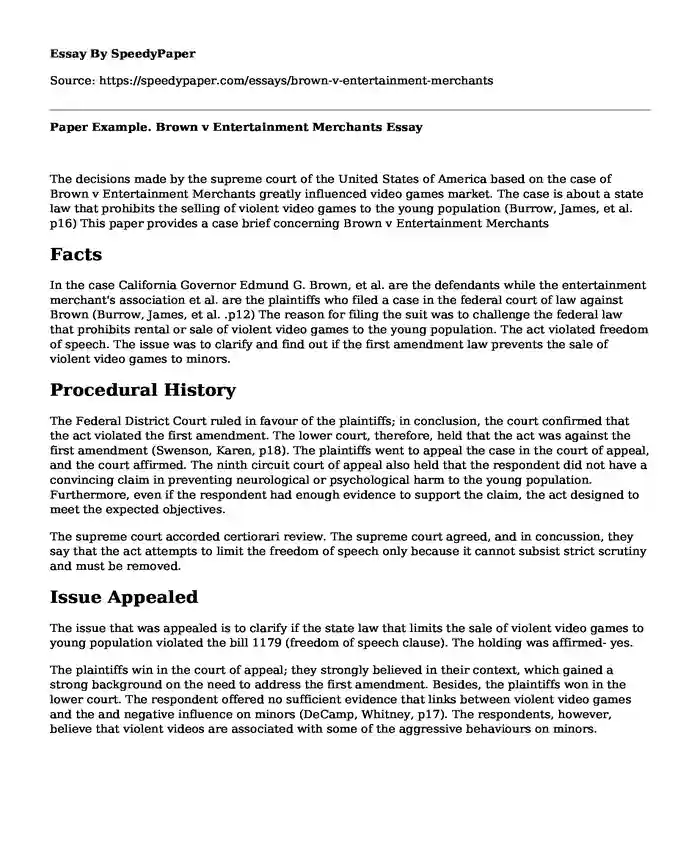
| Type of paper: | Case study |
| Categories: | Video games Violence Judicial system Social issue |
| Pages: | 3 |
| Wordcount: | 644 words |
The decisions made by the supreme court of the United States of America based on the case of Brown v Entertainment Merchants greatly influenced video games market. The case is about a state law that prohibits the selling of violent video games to the young population (Burrow, James, et al. p16) This paper provides a case brief concerning Brown v Entertainment Merchants
Facts
In the case California Governor Edmund G. Brown, et al. are the defendants while the entertainment merchant's association et al. are the plaintiffs who filed a case in the federal court of law against Brown (Burrow, James, et al. .p12) The reason for filing the suit was to challenge the federal law that prohibits rental or sale of violent video games to the young population. The act violated freedom of speech. The issue was to clarify and find out if the first amendment law prevents the sale of violent video games to minors.
Procedural History
The Federal District Court ruled in favour of the plaintiffs; in conclusion, the court confirmed that the act violated the first amendment. The lower court, therefore, held that the act was against the first amendment (Swenson, Karen, p18). The plaintiffs went to appeal the case in the court of appeal, and the court affirmed. The ninth circuit court of appeal also held that the respondent did not have a convincing claim in preventing neurological or psychological harm to the young population. Furthermore, even if the respondent had enough evidence to support the claim, the act designed to meet the expected objectives.
The supreme court accorded certiorari review. The supreme court agreed, and in concussion, they say that the act attempts to limit the freedom of speech only because it cannot subsist strict scrutiny and must be removed.
Issue Appealed
The issue that was appealed is to clarify if the state law that limits the sale of violent video games to young population violated the bill 1179 (freedom of speech clause). The holding was affirmed- yes.
The plaintiffs win in the court of appeal; they strongly believed in their context, which gained a strong background on the need to address the first amendment. Besides, the plaintiffs won in the lower court. The respondent offered no sufficient evidence that links between violent video games and the and negative influence on minors (DeCamp, Whitney, p17). The respondents, however, believe that violent videos are associated with some of the aggressive behaviours on minors.
Application of The Legal Principle
The decision of the court is based on the relationship between the first amendment and the context of the case. Therefore, a content-based limitation on protected freedom of speech must authorise strict scrutiny, which implies that it is defensible by the interest of the compelling government, and it is narrowly designed to serve its interest.
Reasoning
Based on the court decision, the first amendment clause does not comprise of right to share specific content to minors without their parent's consent. Video games such as movies, and plays do not qualify for bill 1179, freedom for speech clause protection (Copenhaver, Allen, p15)
From this case, therefore, we can learn that the government has no power to limit freedom of expression because of the ideas, massage, and subject matter of video games contents. The decision of the court was correct; however, the rationale was not because the court should be considering the effects of violent video games like any other violent form of entertainment.
Works Cited
Burrow, James, et al. "Brown v. Entertainment Merchants Association, 43-44 Burger, Warren, 51, 116-117." algorithms 33.35: 66.
Copenhaver, Allen. "Violent video game legislation as pseudo-agenda." Criminal justice studies 28.2 (2015): 170-185.
DeCamp, Whitney. "Who plays violent video games? An exploratory analysis of predictors of playing violent games." Personality and Individual Differences 117 (2017): 260-266.
Swenson, Karen. "Amicus curiae briefs and the US Supreme Court: When liberal and conservative groups support the same party." Justice System Journal 37.2 (2016): 135-143.
Cite this page
Paper Example. Brown v Entertainment Merchants. (2023, Mar 27). Retrieved from https://speedypaper.net/essays/brown-v-entertainment-merchants
Request Removal
If you are the original author of this essay and no longer wish to have it published on the SpeedyPaper website, please click below to request its removal:
- Free Essay with The Picture of Dorian Gray Analysis
- Free Essay Sample on Macroeconomic Theories
- Psychology Paper Example - Applied Behavior Analysis on ASD
- Free Essay about Starbucks' Organizational Culture and Values
- Essay Sample on Military Myth: Iraq and Afghanistan Veterans
- Presence of Substitutes - Free Essay Sample
- Shaping Hope: Kamala Harris' Rhetoric of Conviction, Emotion, and Logic - Essay Sample
Popular categories




